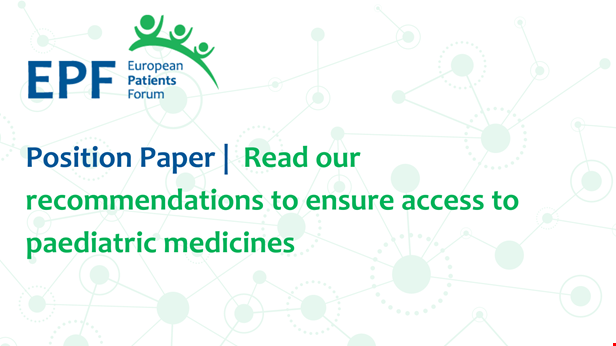The European Patients’ Forum calls for ensuring access to paediatric medicines

As the pharmaceutical landscape evolves, the European Patients' Forum (EPF) put forward some recommendations to safeguard access to essential medicines for children aged 0 to 17 years. Representing the voice of European patients, EPF advocates for continued efforts to encourage research, development, and availability of medicines tailored to the unique needs of paediatric patients.
The existing Regulation (EC) No 1901/2006 for paediatric medicinal products was a groundbreaking step to promote the development of medicines specifically designed for children. At its core, it established a framework of obligations, incentives, and rewards to stimulate research and development in this crucial area. Central to this framework was the creation of the Paediatric Committee (PDCO) within the European Medicines Agency (EMA). The PDCO played a pivotal role in evaluating paediatric investigation plans (PIPs) and advising on paediatric medicines, ensuring the safety and efficacy of treatments for the younger population.
The European Commission's proposal for a new pharmaceutical legislation includes the integration of the Paediatrics regulation. While EPF acknowledges some positive changes, such as increased flexibility in clinical development plans and tighter restrictions on waivers, concerns remain over the limited incentives for paediatric research and the absence of regulatory representation for paediatric medicines. In addition, the new draft does not foresee the establishment of a dedicated working group on paediatrics at the EMA’s Committee for Medicinal Products for Human Use (CHMP).
The Disappearance of PDCO: Implications and Concerns
EPF's primary concern centres around the potential disappearance of the PDCO and its implications. The proposed restructuring of the EMA's organisational structure could inadvertently deprioritise paediatric medicine research and development. This shift raises several critical issues:
- Despite some progress since the implementation of the regulation, manufacturers remain reluctant to conduct paediatric studies. PDCO acts as an independent third party with broad representation. Under the new proposed structure, it is unclear whether EMA will have the leverage and resources to push for specific studies, especially in the most underserved and complex populations, such as neonates.
- Workload and expertise, the PDCO manages a substantial workload, overseeing more than 1300 procedures annually, a number that will likely increase under the new legislation. The loss of the PDCO could affect the coordination and oversight of paediatric assessments unless the EMA receives substantial additional resources.
- Patient representation, the absence of a cross-cutting paediatric working party poses a challenge for patient representation and involvement. Patients with expertise in paediatric medicines must be involved early in the development process, contributing to practical evaluations and cross-learnings.
Recommendations
EPF offers several recommendations to address these concerns and ensure continued focus on paediatric medicines:
- Retaining a paediatric committee, with adequate funding, decision-making power, and representation at the CHMP
- As an alternative, if the co-legislators opt for the proposed simplified EMA structure, EPF recommends the creation of a scientific working party under the CHMP explicitly focused on paediatric medicines and with mandated participation of patients’ and healthcare professionals’ representatives.
- In addition to patients and healthcare professionals’ representatives, EPF advocates for specific NCA representatives with expertise in paediatric medicines to participate in the CHMP, bridging the gap between PIPs and marketing authorisation.
Ensuring continued research, development, and access to medicines for paediatric patients is paramount for their health and wellbeing. These recommendations aim to ensure a continued focus on paediatric medicines under the new pharmaceutical legislation, ultimately benefiting the youngest patients across the EU.
For a more detailed view on EPF’s recommendations, please consult the full position paper.
